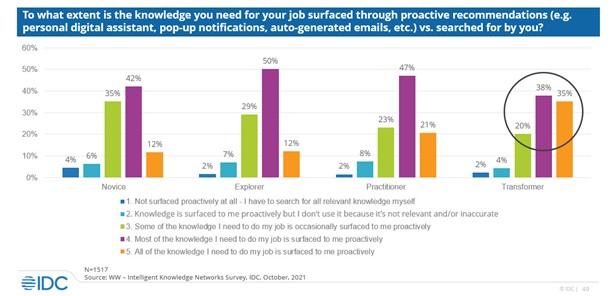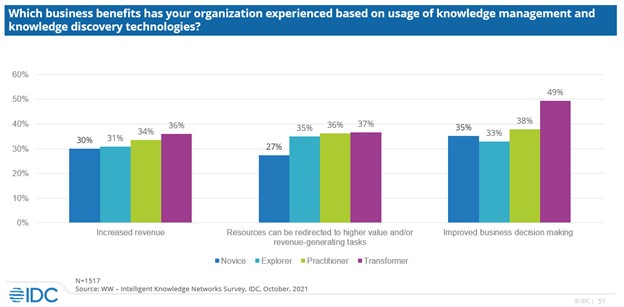
“Search” is no longer king at the world’s savviest knowledge management users. What has replaced it?
In 2022, we live in a browse-to-content world; that’s all Millennials, who now make up over half the workforce, have ever known. For workers of a “certain age” – Baby Boomers and GenXers – the radical technology innovation of their professional lives was the World Wide Web and search engines for exploring it. But Millennials are collaborators and feel better about making decisions once they’ve gathered input from colleagues and recognized experts, as they tend to value these opinions over personal research.
So when it comes to mining enterprise knowledge management systems, what would be more useful to Millennials instead of simply a blank SEARCH box would be something approximating a referral engine – a portal that would not force them to slog through pages of vaguely defined search results, but instead would directly send them the useful, targeted information they’re after.

A recent IDC survey* found that the most sophisticated users of knowledge management systems – organizations IDC categorizes as “transformers” – routinely see knowledge proactively surfaced, with one-third having all of their knowledge surfaced proactively. In other words, their systems are designed to meet the research preferences of Millennials, which increasingly are shared by many others, including senior executives.
In addition, having grown up with online access, Millennials (rightly) feel like digital experts and quickly grow impatient with sites that don’t deliver at a high level of efficiency. “Used to getting their data immediately, Millennials have little patience with vendors who don’t quickly provide the requested information,” says IBM’s Bill Grady. “What they want is data, speed, and advisors they can trust.”
That’s why the optimal user experience for Millennials is customizable, topic-specific dashboards that deliver an organized presentation of relevant, high-quality content useful to the Millennial consumer. When large, research-driven organizations implement these types of dashboards as the primary user experience, business research content downloads double. That’s a number difficult to argue with.
In addition, with AI-based machine learning, it is now possible for the computer to read research reports and articles and tell a user what it finds. The technology exists for figuring what text represents important ideas in key documents; these important ideas can be pulled into an automatic “insights report” that can transform the experience of research. And once again, the most sophisticated users of knowledge management systems realize the greatest benefits, especially improved business decision making, according to IDC’s survey.

We will share more of IDC’s illuminating research findings in future posts. But for now, suffice it to say knowledge management systems are evolving to deliver both greater efficiency and value to organizations that use them aggressively.
* IDC multi-client study, “Intelligent Knowledge Networks Survey Analysis”, document number US48814422, December 2021